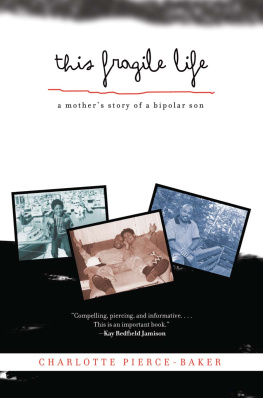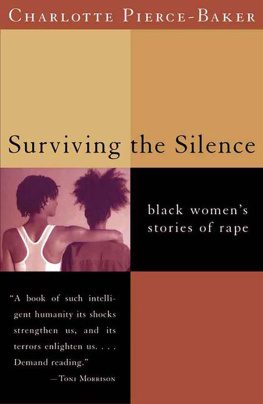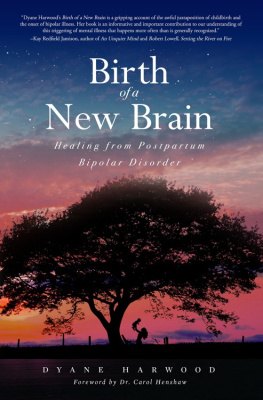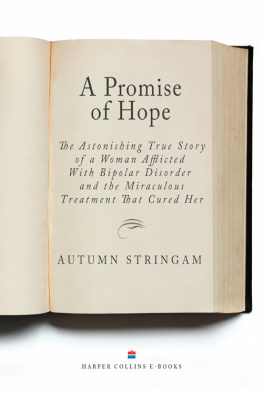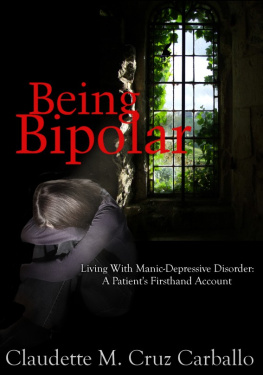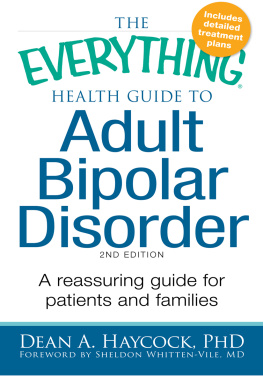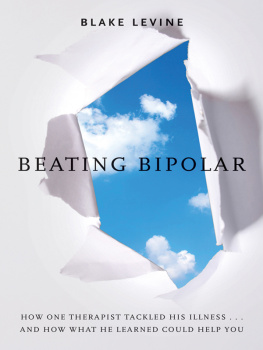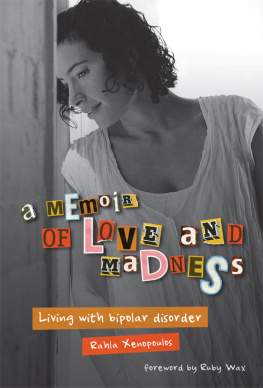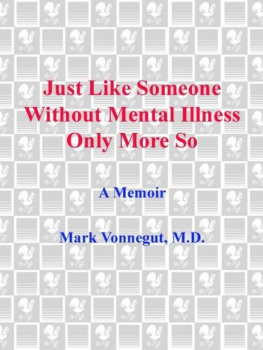Copyright 2012 by Charlotte Pierce-Baker
Poetry and prose excerpts copyright 2012 by Mark Frederick Baker
All rights reserved
First edition
Published by Lawrence Hill Books
An imprint of Chicago Review Press, Incorporated
814 North Franklin Street
Chicago, Illinois 60610
ISBN 978-1-61374-108-5
To ensure privacy, many names have been changed.
Library of Congress Cataloging-in-Publication Data
Pierce-Baker, Charlotte.
This fragile life : a mothers story of a bipolar son / Charlotte Pierce-Baker. -- 1st ed.
p. cm.
Includes bibliographical references and index.
ISBN 978-1-61374-108-5 (hardcover)
1. Manic-depressive persons--United States--Biography. 2.
Manic-depressive persons--Family relationships--United States. 3.
African Americans--Mental health. I. Title.
RC516.P58 2012
616.8950092dc23
[B]
2011050228
Interior design: PerfecType, Nashville, TN
Printed in the United States of America
5 4 3 2 1
For Mark
Who trusted me to tell his story
contents
preface
IN THE SUMMER OF 1996, our son, Mark, made his cri de coeur from Los Angeles. My husband and I were thousands of miles away in Philadelphia, Pennsylvania. Mark was twenty-five years old, living with his fiance, Lisa, and pursuing an advanced degree in film studies at the University of Southern California. Earlier that evening, when he could not find us by telephone, Mark had called Washington, DC, to speak with my father, who, in turn, called us. My father described Mark as being in some sort of trouble. Mark was saying strange things and would not stop talking. He told us to wait for Marks call.
When I answered the phone a few hours later, I heard the panic in my sons voice. In guarded tones, he whispered, Mom, theyre watching me. I can see them all around. Theyre watching me. I dont know what to do. Help me, Mom! There were tears just beyond his words. His voice sounded hurried, fearful, tight; I felt his agitation. I almost believed he was being watched.
My husband and I desperately tried to figure out what was happening with our only son. Was he in physical danger? Was he having a nervous breakdown? His need for rescue was clear. Talking to him in turns, we attempted to convey some degree of calm. We assured Mark that his father would catch the next plane to Los Angeles to bring him home to Philadelphia. I would be at home, waiting.
In my absolute navet, I believed that Mark simply needed a few weeks to regroup from the stress of graduate school. In reality, our son was experiencing his first psychotic episode, and he would later be diagnosed with Bipolar Disorder Type I. We had been blindsided. Thousands of miles away, Mark had progressed brilliantly yet sleeplessly through his graduate courses at USC. Amidst his studies, he lost his bearings. He heard voices from Neptune speaking of cosmic designs, which competed regularly with the wisdom of his professors. Mark was gaunt, messianic, in touch with planets and whole worlds of delusion unknown to us. In real time, he would come to meet the rough, cold, metallic life of city jails and hospital gurneys, the suffering of an unquiet mind, to borrow Kay Redfield Jamisons phrase.
There are few published accounts of families dealing with bipolar disorder; still fewer are written from a mothers perspective. This Fragile Life is the story of an upper-middle-class, African American family facing the challenges of mental illness. Our son, Mark, is a graduate of Germantown Friends, a Quaker preparatory school, in Philadelphia, the recipient of a bachelors degree from the University of Pennsylvania and a masters degree from the University of Southern California. I was not nave enough to think these privileges guaranteed exemption from illness, accident, disability, or even death. Looking back, however, I realize I had once assumed that giving Mark the best education available would enable him to do whatever he wanted in life and to succeed. As his mother, I never could have imagined he would wind up handcuffed, barely clothed, dirty, mad, and in jail. When Marks first psychotic episode occurred, my real education began.
The horror of what was happening to Mark was compounded by our familys ignorance; we knew nothing of mental illness except what we had viewed in films or read in newspapers and novels. The images of mental illness in popular culture are exaggerated and meant to shock; in them, we saw no resemblance to our son. We were not in close proximity to Marks adult life and had not been near enough geographically to witness his day-to-day behavior. He had not lived with us since leaving for college at the age of eighteen.
When Mark crashed, we attempted to piece together the previous months and years of his life. We discovered he had been bouncing from depression to hypomania, back to depression and then to full mania, often combined with bouts of paranoia and psychosis. We also learned that for many years, the exact number yet to be determined, he had tried to quiet his demons with drugs and alcohol. I learned that the name of this double affliction, which combines both mental illness and substance addiction, is dual diagnosis. Gradually, Mark descended into madness and then hit rock bottom.
Our nightmare existence commenced: hospitalizations, calls in the night, pleas for money and more money, jail (more times than we could admit to ourselves), lawyers, prescriptions (when we were lucky), doctors, drug and alcohol relapses (yet again), and continuous disputes about how to live and how not to live in order to remain well. Marks journey toward recovery has been long, arduous, and nearly fatal. At this point, it seems an eternity.
Our son, Mark, is a dedicated poet. The music of words has always fascinated him; he began writing verses when he was nine years old. Throughout his years of illness, poetry has been tethered to the emotional currents of his daily life. Mark and I decided to include some of his poetry and prose throughout This Fragile Life, in particular his post-psychotic explanations and self-revelations. He writes eloquently of becoming a father while suffering from depression and mania, high on drugs and alcohol. In haunted words, Mark gives voice to the melancholy of his lost life:
Oh what I wouldnt give
to have it all back again
the way we lived
and how the city lights
drowned out the sin
eager to see those freeways
weave in and out for miles
while listening to Friday night DJs
spin their hard core styles.
So enchanted
I took this fragile life for granted.
My husband and I awake each day with gratitude for our sons willingness to meet the challenges that bipolar disorder brings. At times, I am still fearful; I feel vulnerable and alone. Our son must take care of his illness, day by day, for the rest of his life. There is no cure. Bipolar is forever.
one
early and middle years
MARK WAS A GORGEOUS NEWBORN. Everyone thought so: our friends, his grandparents, his aunts and uncleseven our next-door neighbors. He was a C-section baby and had not one wrinkle on his smooth brown body. Only a frown creased his brow, as if he had a premonition of his future. Mark was a quiet, amiable baby, easily amused that winter of 1971. My husband and I loved to exchange Mark stories at the end of a day. Youll

